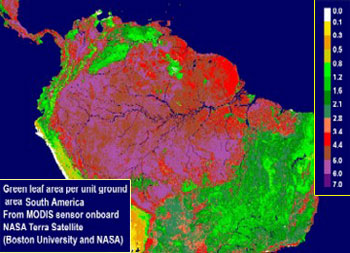Amazon rainforest does have rainy and dry seasons
Amazon rainforest does have rainy and dry seasons
mongabay.com
March 12, 2007
A new study using NASA satellite images found evidence of seasonality in the Amazon rainforest. The results, published in the March 20 issue of the Proceedings of the National Academy of Sciences, show that the Amazon had 25 percent more leaf coverage in the dry season and 25 percent less in the rainy season.
“Our finding is similar to the discovery of a large green continent, nearly a third the size of South America, appearing and disappearing each year,” explained Ranga Myneni, professor of geography and environment at Boston University, the lead author of this study. “This has very important consequences for weather, atmospheric carbon, water and nutrient cycling, given that leaves are the air purifiers and food factories of our planet.”
The paper indicates that rainforest itself plays an role in initiating the transition from the dry to the wet season.

Image modified from a graphic produced by the authors. |
“Rain forests sprout new leaves in anticipation of the coming dry season,” stated a release from Boston University. “The greener forests capture more sunlight, absorb more carbon dioxide and evaporate more water during the dry season compared to the wet season… By gradually humidifying the atmosphere, the forests play an integral role in the onset of the wet season.”
The findings are consistent with a study published a year ago in Geophysical Research Letters which reported that the Amazon has fastest leaf growth during the dry season.
The new study was backed by NASA.
CITATION: Myneni, R.B., et al. (2007) Large seasonal swings in leaf area of Amazon rainforests. Proceedings of the National Academy of Sciences (PNAS). March 20, 2007.
This article used quotes from a Boston University news release.







